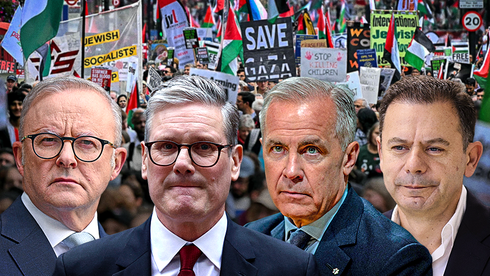
In the U.S.’s first reaction to the wave of countries announcing their recognition of a Palestinian state, U.S. State Department official on Monday morning criticized Britain, Canada, Australia and Portugal’s announcements recognizing a Palestinian state. Speaking to the French news agency AFP on condition of anonymity, the official called the wave of recognitions “performative.” “Our focus remains on serious diplomacy, not performative gestures,” the American spokesman said. Our priorities are clear: the release of the hostages, the security of Israel, and peace and prosperity for the entire region that is only possible free from Hamas. On Thursday the United States vetoed a unilateral Security Council resolution calling for an immediate ceasefire in Gaza that did not condemn Hamas and and did not condition the ceasefire on the release of hostages. Prime Minister Benjamin Netanyahu said the response to Britain, Canada and Australia’s recognition will wait until after he returns from the U.S., where he is traveling this week to speak at the U.N. General Assembly and to meet President Donald Trump. “It’s not going to happen. There will be no Palestinian state to the west of the Jordan River,” Netanyahu said. He argued that the leaders who recognized a Palestinian state on Sunday, and those planning to do so later this week, are “are rewarding terror with an enormous prize” by recognizing statehood after October 7. In response to calls from Yesha Council members and right-wing ministers who urged immediate application of sovereignty in the West Bank, Netanyahu signaled that the decision also depends on President Trump. Early Sunday evening Canada, Britain, Australia and Portugal announced recognition of a Palestinian state. Canadian Prime Minister Mark Carney opened the wave of recognitions, saying “the current government of Israel is systematically working to prevent the establishment of a Palestinian state.” Canada’s statement cited among other things the October 7 massacre carried out by Hamas, accelerated settlement construction and rising violence against Palestinians, the E1 building plan and Knesset votes on annexation — and “the contribution of the Israeli government to the humanitarian crisis in Gaza, including preventing access to food and other humanitarian supplies.” Australia said its recognition “acknowledges the legitimate, long-standing aspirations of the Palestinian people for a state of their own.” British Prime Minister Keir Starmer said his recognition “is not a reward for Hamas, because it will have no future, no role in Palestinian government and no role in security.” Starmer said he had ordered additional sanctions on Hamas, without giving details. French President Emmanuel Macron, the leader of the broader initiative, is expected to formally announce France’s recognition of a Palestinian state at the U.N. Monday with the opening of the second part of the French-Saudi international conference. Ahead of that declaration, Macron told CBS’s Face the Nation: “This is only the beginning of the process.” He also addressed Trump’s postwar plan, saying: “If the precondition is a mass displacement of Palestinians from the Strip — that is simply madness. Such a project would be a humanitarian catastrophe. We must be clear that uprooting people in order to gain land not under Israeli control to prepare for the day after is totally crazy and unacceptable to all of us.”